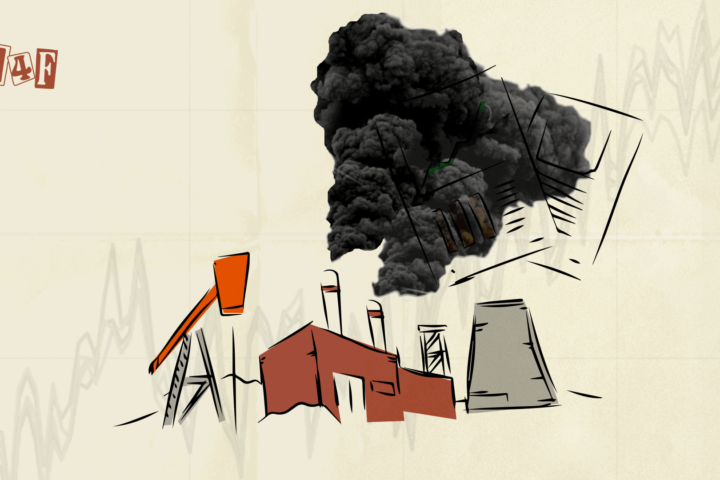The history of climate science obstruction by the fossil fuel industry
If you have even a basic understanding of climate change, then you are probably aware that the combustion of fossil fuels such as coal, oil, and natural gas are the main drivers of this crisis. It is reasonable to state that if the fossil fuel industry had stopped its polluting activities and governments had stopped subsidizing Big Oil and Gas, we wouldn’t be in this predicament. But, in recent years, you may have observed that fossil fuel companies are trying to alter the narrative surrounding their contribution to the climate crisis. Companies such as Shell, Chevron, and ExxonMobil have periodically attempted to turn their branding around — using greenwashing tactics as a means to distort and deny the consensus around global warming and the climate crisis. These methods can be quite effective, and thus it is important to call those who use them out on their lies and examine the historical context behind them.
Climate obstruction is the act of hiding the true extent of the climate crisis from the general public. The fossil fuel industry has been one of the biggest players of this game, consistently misleading people into continuing the use of fossil fuels. This includes spreading the myth that the climate crisis is not as dire and dangerous as it seems, and blaming and discrediting the scientists who have said otherwise. In the case of BP (British Petrol, now Beyond Petrol), this effort went to the extent of their creation of the concept of the “carbon footprint” in a bid to shift responsibility for the climate crisis onto the general populace and blame emissions on individual actions.
“Doubt is our product”
It all started when the fossil fuel companies’ own scientists found out that carbon emissions were warming our planet. And of course, it’s not easy to force your opinion onto the public when the facts themselves are against you. So, the companies attacked the facts themselves – creating a world, through misinformation campaigns, where scientists were false alarmists and global warming was nothing more than a huge fraud – and, if it should actually exist, not as bad as it seems. It took time, but within a few years, global networks of academics, pseudo-environment groups and faux research set to work spreading the fossil fuel industries’ lies to the world and raising questions against the consensus on global warming.
Changing people’s worldview requires a convincing story that one can follow and defend. The goal of these efforts was to create such stories and force them down the public’s throats. For that, massive misinformation campaigns were created and funded by the fossil fuel industry and right-wing groups. Climate science was portrayed as a controversial field, with no definite evidence supporting anthropogenic climate change. Climate-denying scientists received funding, and were urged to create false research to attest to this. Think tanks were brought in to support this effort, and conservative media and public figures such as politicians and actors were encouraged to spread it. And this information was further amplified by completely third-party groups, so that it couldn’t be traced to the fossil fuel industry.
How does it work?
The company Exxonmobil has known about climate change and its severe impacts since 1977 for sure, having received the very first study about the impact of gases in the atmosphere in 1957 already and the relation of rising sea levels and CO2 in 1968. Yet, they have spent decades publicly refuting climate science and spreading climate misinformation.
Exxon’s climate-related study was leaked in 2015. After 8 months of rigorous investigation, reporters from InsideClimateNews found that in 1977, a scientist hired by Exxon called James Black looked into the issue of global warming. He predicted that the parts per million (ppm) of CO2 in the atmosphere would double by 2060; and that, as a result, the temperature of the world would rise by 2℃. He also predicted that the world had a window of only 5-10 years to tackle this catastrophe in order to avoid dire implications for humanity. These allegations are still completely denied by Exxon.
However, the fact remains that when the same results were presented by NASA scientist James Hansen in a congressional hearing in June 1988, Exxon retained the stance that climate science was still controversial. It also launched a Global Climate Coalition (disbanded in 2002) – a group created with the purpose of spreading climate misinformation. This prevented countries like the US, India and China from signing a crucial climate treaty called the Kyoto Protocol.
Shell, too, has been found to have employed similar tactics. The findings from their 1988 internal report showed that CO2 levels could double even earlier than the Exxon study had predicted – in 2030 itself. Shell’s report also predicted a 1 meter sea level rise, habitat destruction, increase in floods, and that it would “drastically change the way people live and work.” Disintegration of the west Antarctic ice sheet was also predicted, which would lead to 5 to 6 meters of rise in the sea level. This report was first disclosed by a Dutch news organisation in 2018.
In the 1980s, it was the fossil fuel corporations that knew the most about the impacts of climate change. Yet, they chose to lead the world deeper into the climate crisis, at the expense of humanity. But with the debate about the climate crisis having become more relevant to the general public over the past few years, it is no longer possible for most companies to officially, completely deny the existence of the problem. Instead, they use greenwashing to hide their actual doings from the public. Every oil giant is suddenly a huge charity organisation, every coal pit a paradise.
In order to learn more about this, and understand the fossil fuel industry’s tactics, we interviewed Rebecca Leber, a senior reporter covering the climate crisis at Vox.
“Right now, the major oil companies have come out in support of a tax on carbon pollution, which was seen as a really big development in the climate fight, as a tool that the companies have long opposed but finally coming along and saying they would support some level of a price on pollution. That said, they might support that on the high, official level, but behind the scenes, we’re still seeing lots of money being poured into groups that are opposing climate action. So, they’re working two different angles here, “ she explains.
This huge climate-denying machine has continued to chug along happily, fueled by fossil-fuel mega-giants; all the while infecting the minds of the populace with the notions that climate change doesn’t exist, isn’t that bad after all, or that the companies themselves are doing everything possible to save the world – and simultaneously masking the pollution and damage caused by the very same industry that fuels it.
Unless we stop it.
But how?
We as people and global citizens have the ability to halt the working of this machine! Remember, the machine works because we are an integral part of the system it perpetuates. Once we become aware of how fossil fuel companies distort and conceal the truth, we can then counter them by spreading accurate information.
To do this, we must first educate ourselves more and more about the obstruction of climate science and other destructive acts of the fossil fuel industry. Reading this article is a great start! For further information, you can check out the resources linked throughout the article and do your own research.
Furthermore, educate yourself about real climate science! There are several resources available online which explain the facts behind climate change in easy-to-understand language. Look them up and understand the impacts of climate change on our earth.
Your next step should be creating an impact around you! Start bringing up the topic of climate change and fossil fuels with family, friends and other acquaintances. Initiate conversations around yourself about climate science. Be open to learning new things! Help people around you make the same connections you did about climate change and the fossil fuel industry.
Once you have a few like-minded people around you, join climate advocacy groups with them. If you can’t find any around you, create your own! Collectively call fossil fuel companies out on their crimes against nature and the earth, and spread awareness about the climate crisis. Remember, your strength lies in numbers and people!
Call out the third-party people funding and supporting fossil fuels. This can include scientific institutions, banks or politicians. Urge them to invest their money and energy into cleaner causes, and remind them that as consumers, you won’t stop until your demands are fulfilled. Again, it’s better to do this by becoming a part of existing campaigns and movements! Some great examples of these include the Clean Up Standard Chartered campaign, the Paid to Pollute lawsuit and the Bank for a Better Future campaign. You can find more local campaigns in your own area, or start a new one!
We need to understand that the majority of the blame for causing the climate crisis falls on the fossil fuel industry, rather than on individuals as the industry would have us believe.
“This is an issue affecting our generation. It’s affecting people now, but it will affect us for the rest of our lives.” said Rebecca.
Let us find innovative ways to frame the issue and make it our own narrative. Let us continue to rise up and expose the industry’s lies to make way for the truth!

